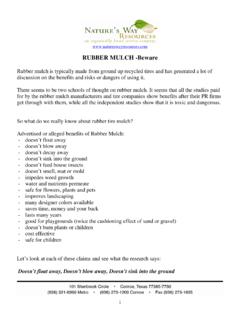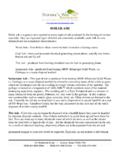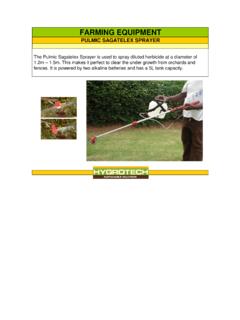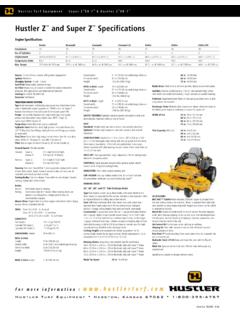Transcription of RUBBER MULCH -Beware - natureswayresources.com
1 MULCH -BewareRubber MULCH is typically made from ground up recycled tires and has generated a lot ofdiscussion on the benefits and risks or dangers of using seems to be two schools of thought on RUBBER MULCH . It seems that all the studies paidfor by the RUBBER MULCH manufacturers and tire companies show benefits after their PR firmsget through with them, while all the independent studies show that it is toxic and what do we really know about RUBBER tire MULCH ?Advertised oralleged benefits of RUBBER MULCH :-doesn t float away-doesn t blow away-doesn t decay away-doesn t sink into the ground-doesn t feed house insects-doesn t smell, mat or mold-impedes weed growth-water and nutrients permeate-safe for flowers, plants and pets-improves landscaping-many designer colors available-saves time, money and your back-lasts many years-good for playgrounds (twice the cushioning effect of sand or gravel)-doesn t burn plants or children-cost effective-safe for childrenLet s look at eachof these claims and see what the research says.
2 Doesn t float away, Doesn t blow away,Doesn t sink into the RUBBER mulches have a specific gravity greater than water hence they do not float orwash off as easily as some other materials likebark mulches. If the soil is healthy and fullof microbes and earthworms ALL materials will settle and sink over time (rememberCharles Darwin s work on earthworms). If a material is heavier (denser) than water, it willsink or settle faster than a lighter material like an organic at Texas A&M University found that the particles from shredded brush ( nativemulch) would physically lock together preventing erosion even in extreme weather have also found that during decomposition that bacteria produce chemicalscalled polysaccharides that act as glue to help hold the particles together.
3 The hyphae frommany fungus species also help to lock the particles together and to the soil surface. As aresult, the native mulchand compost resisted erosion (floating or blowing off) better thanany other material t decay away,Lastsmany yearsRubber MULCH is broken down by microbes like any other product (remember microbes canbreak down granite rocks into soil), RUBBER is easy by comparison. The RUBBER encouragesspecies of bacteria that break down RUBBER and RUBBER like products in your home tomultiply. The additives in tires to prevent bacteria decay (which are toxic chemicals) arebroken down by whiteand brown rot fungal species that live in soil.
4 This samedecomposition is what releases the toxic chemicals in t feed house insectsThis is a true statement, I do not know of anything that eats tires except , the tire MULCH does kill many species of good microbes that kill insects andprevent disease. The toxic chemicals in the tires will also kill beneficial insects that helpcontrol t smell, mat or moldThis may be a matter of opinion, but most people find that RUBBER MULCH starts to stink as itgets hotter. On a hot day it has a strong stench. As tires are ground up into chips of surface area is greatly increased and all the new surfaces are freshly exposedallowing for maximum odors to be released.
5 Many people get sick from just being in thesales area of a store selling new RUBBER MULCH heats up, it releases toxic gases such as volatile organic compounds(VOCs) and another class of chemicals called polyaromatic hydrocarbons (PAHs). Thesegases have been found to cause irritation of the nasal and respiratory passages, centralnervous system damage, depression, headaches, nausea, dizziness,eye and kidney damage,and dermatitis. Hence, ground tires should never be used in an enclosed area or effects would be even worse in areas of high air pollution ( Houston).It is true that RUBBER MULCH will not mat down as easily as organic mulches, since thebeneficial microbes that create soil structure, prevent insect and disease problems, cannotlive in to mold, I have seen many tires used on piers and boat docks covered with algae.
6 I havealso seen tires used as planters covered with what appears to be mildew and mold. Mildewand mold will grow on about any surface if moisture is present,unlessit is too toxic andsomething kills weed growthIn comparison studies of several MULCH types in herbaceous perennials, RUBBER tire mulchwas less effective than even raw wood chips. Other studies have found that even sawdustworked better and have found RUBBER MULCH less effective than straw and other studies have found that RUBBER tire mulches kill many species of plants hence thepublic relation specialist spin it off as retardsor impedes weed growth . Who wantedflowers in the first place?
7 Also as temperatures rises the type of plants that will survive is reduced and RUBBER mulchcan get fairly hot (see below). Metal toxicity also reduces the type of plants that can live andgrow in RUBBER MULCH (see below). and nutrients permeateSome researchers have found that ground up tires can absorb chemicals from fertilizers andpesticides preventing them from leaching into ground water. Hence, fewer nutrients reachthe plants. Eventually, the tire chips will degrade and the stored chemicals will be releasedmost likely at time when one does not want or need will run through the tire MULCH as it is highly permeable. However, the problembegins when the water reaches the surface of the soil.
8 Earthworms and soil microbes createsoil structure allowing air and water to enter the soil. Earthworms and microbes requiredecomposing organic matter as a food and energy source. Without this food source most ofthe earthworms and microbes will die off and the soil structure will collapse over this happens, the soils will become anaerobic (favors root pathogens) and water andair cannot enter easily. Hence, conditions may be created that favor disease and sincethewater can no longer be absorbed, it must run for flowers, plants and petsResearch at Bucknell University has found that the leachate from ground tires can kill entireaquatic communities of algae, zooplankton, snails and fish.
9 Even atlow concentrations itcan cause reproductive problems and precancerous lesions. Also, marine life from seaweedsto plankton is negatively toxic nature of the leachate from tire RUBBER is due at least in part to the chemicals usedin producing tires (cadmium, chromium, aluminum, copper, iron, manganese, molybdenum,selenium, sulfur, and zinc). Of these minerals, RUBBER tires may contain extremely highlevels of zinc even up to 2% of the tire mass. Many plant species have been shown toaccumulate zinc in their tissues to the point of death. USDA researchers who have studiedthe effects of metals in sewage sludge, biosolids and compost, have found that ground rubbershould not be used on any agricultural or garden soil, potting media, or compost.
10 Yes-somecompanies use tire chips and crumb RUBBER as a bulking agent for compost and we wonderwhy the compost does not work and is toxic to plants!Other RUBBER leachates have been found to cause problems from skin and eye irritation organ damage and even death. Long term exposure can lead to carcinogenesis andmutagenesis. For example, 2-mercaptobenzothiazole used in vulcanizing RUBBER is highlypersistent in the environment and harmful to aquatic life. Ground RUBBER also containsaclass of chemicals called Polyaromatic hydrocarbons (PAHs) that many studies have foundextremely toxic to humans and the has also found that the toxicity of leachate from the RUBBER tire MULCH increasesover time as the rubberbreaks landscapingI am not sure what is meant by this claim.










